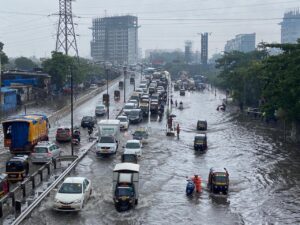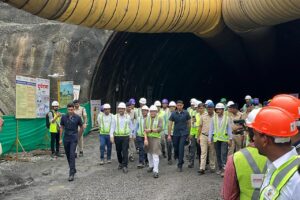Maharashtra Records First 40°C Temperature of 2025 in Mid-February

Maharashtra Records First 40°C Temperature of 2025 in Mid-February
Pune, February 14, 2025 – Maharashtra has recorded its first 40°C-plus temperature of the year earlier than expected, marking an unusually intense onset of summer. On February 13, 2025, Mahad and Chiplun registered scorching highs of 40.3°C and 40.5°C, respectively, making them the hottest locations in the state.
Other regions also experienced soaring temperatures, with Karjat (38.8°C), Badlapur and Manor (38°C), and Palghar (37.8°C) recording significant heat levels. Mumbai and Ratnagiri, though slightly cooler, still faced uncomfortable highs of 36°C.
Temperature Readings Across Maharashtra (February 13, 2025)
- Mumbai & Ratnagiri: 36°C
- Thane & Talasari: 37°C
- Navi Mumbai: 37.3°C
- Panvel & Dombivli: 37.5°C
- Palghar: 37.8°C
- Badlapur & Manor: 38°C
- Karjat: 38.8°C
- Sawarde: 39.5°C
- Mahad: 40.3°C
- Chiplun: 40.5°C
- Pune: 34.7°C
The widespread heatwave has raised concerns, as many parts of the state are already experiencing mid-summer temperatures in February.
IMD Forecasts Continued Dry Spell and Rising Temperatures
According to Anupam Kashyapi, former head of weather forecasting at IMD Pune, the India Meteorological Department’s Extended Range Forecast (ERF) predicts minimal rainfall until early March. This prolonged dry spell is expected to further elevate temperatures across northwest and central India, including Maharashtra.
While some northern plains and southern states like Kerala, Tamil Nadu, and Karnataka may receive occasional rainfall, maximum temperatures in northwestern and western India are likely to rise further by the end of February. Even coastal regions, such as Konkan and Madhya Maharashtra, may experience warmer-than-usual night temperatures.
Heatwave Raises Concerns Over Water Shortages and Health Risks
The early surge in heat has alarmed residents and authorities alike. Experts warn that prolonged high temperatures could lead to water shortages, increased electricity demand, and health risks such as heatstroke. Officials urge citizens to take precautions, including staying hydrated, avoiding direct sunlight during peak hours, and wearing light clothing.
As Maharashtra braces for what could be an extended and intense summer, the premature temperature spike highlights shifting climate patterns and their growing impact on daily life.












